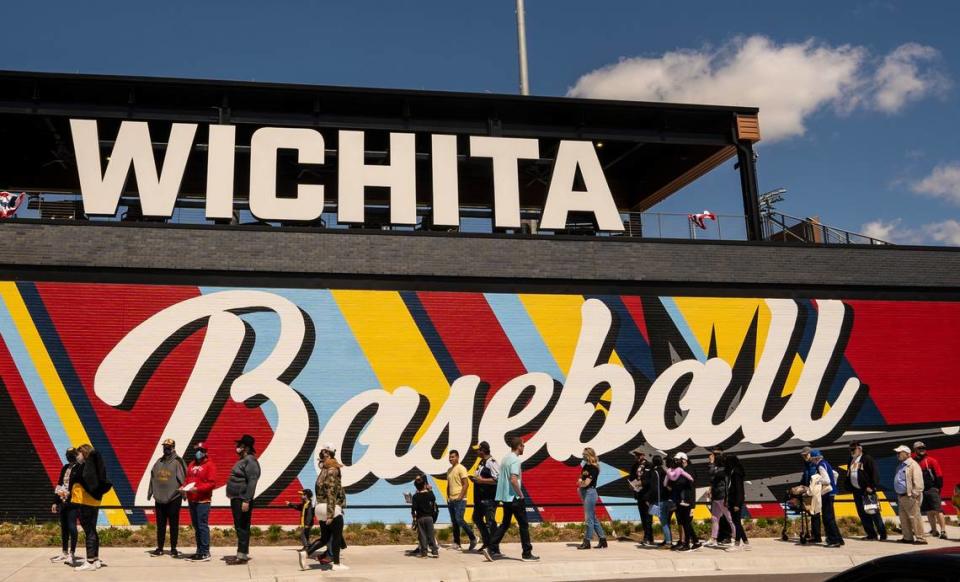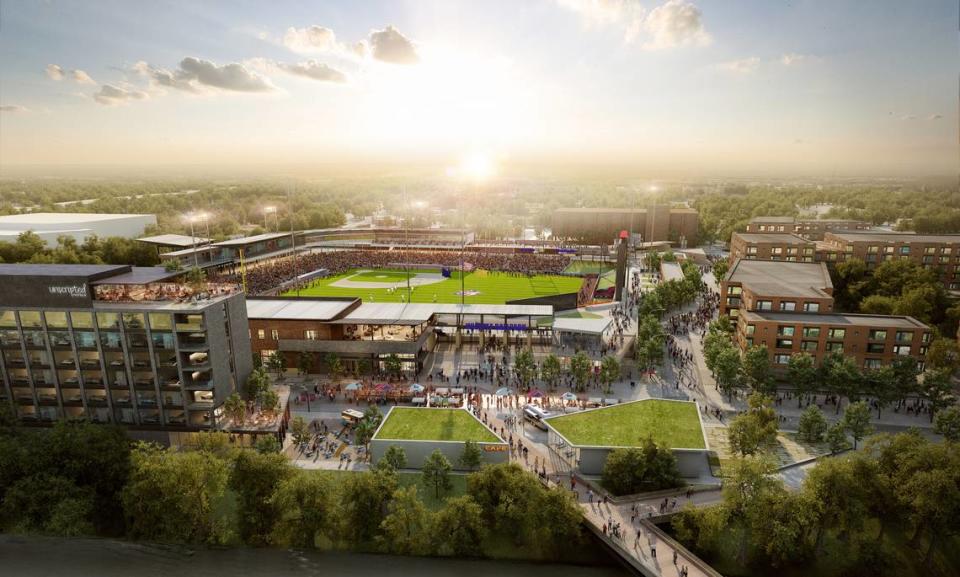Should Wichitans care when ballpark development starts? If you pay taxes, then yes
The first phase of development around Riverfront Stadium was supposed to be finished by July 2024. That already was behind schedule.
Now construction isn’t expected to start until late summer or early fall next year.
Should Wichitans care that the project is so delayed?
Yes, if they value their pocketbooks.
If development is delayed any further, new businesses won’t be open to generate money needed to pay back what the city borrowed to build the ballpark.
That means the city would have to use taxpayer money earmarked for other things to pay back the state.
“This is going to take money out of parks, streets, public safety,” said Vice Mayor Mike Hoheisel.
He made the comment in August before voting with five other council members to buy back two acres around the ballpark and resell the land for a dollar an acre to Overland Park-based EPC Real Estate Group, which is now the sole entity working on the first phase of development around the stadium.
Hoheisel said he supports this development because he sees no alternative that doesn’t involve redirecting money intended for public services to pay for the stadium.
“I don’t think anybody’s real happy with how the process has played out, and I appreciate the concerns of many of the people who have reached out to me from the public, but I am supportive of this because if nothing’s going to be in the ground, we’re going to be on the hook for making the payments.”
At $85 million, Riverfront Stadium is one of the most expensive Minor League ballparks in the country.
It is supported by $42.14 million in sales tax and revenue bonds that were issued in 2018 through a state program meant to be used for tourist attractions that draw new money to Kansas.
When STAR bonds projects work as intended, the new sales tax revenue generated by a development allows cities to make annual payments to the state and retire debt over the 20-year life of the bonds.
Basically, it’s a way for cities to get new attractions without asking taxpayers to pay for them up front.
When STAR bonds projects don’t pay for themselves, however, cities have to get creative.
The good, the bad and the debt
As promised development around Riverfront Stadium failed to materialize in the several years since the first contract was inked, Wichita has tapped into sales tax revenues sparked by an earlier phase of bonds that supported the WaterWalk development and renovations around the Keeper of the Plains in order to make its annual debt payments.
That’s the good news.
The bad news is these River District STAR bonds were issued in 2007, and they’re good for only two decades. That means the city can’t draw upon their revenues to pay off ballpark debts after October 2027.
On the positive side, state records show that last year for the first time, the stadium project and surrounding businesses generated enough sales tax — $3,673,619 — to support 2022’s $1,828,556 interest payment on the stadium. That includes sales tax collected from other establishments in the STAR bonds district, such as Milkfloat, the Monarch and the Wichita Ice Center, as well as ballpark sales.
The project hit its revenue mark in 2022 despite Riverfront Stadium having the lowest attendance in the 10-team Texas League last year, data from Ballpark Digest shows. Attendance is up 40% to an average of 4,675 fans per game for 2023.
This year, payments on the principal kick in, bringing the total payment to $2,328,556 including interest.
By 2025, the annual debt service will hit $3,942,756, where it will stay more or less flat until 2038.
If the annual payment can’t be made, the official bond statement for the stadium requires the shortfall to be covered by the city’s share of local sales tax.
That means residents doing business around the city — not only in the River District — would pick up the tab for debt payments. The 1% sales tax wouldn’t go up, but the city’s share of revenue, which has historically supported highway projects and more recently other infrastructure, including roads and bridges, would be diverted.

City Treasurer Mark Manning declined to say whether he thinks the STAR bonds district will generate enough sales tax to support annual payments in 2023 and beyond.
In an e-mail, he wrote: “The city does not provide guidance on STAR bond district revenues, nor is it appropriate for the city to speculate on a hypothetical scenario regarding future STAR bond District revenues.”
To finance the ballpark, the city used almost every tool it could in its funding mechanisms toolbox.
That means it soon will take on additional debt related to other financial incentives supporting the ballpark project.
The city’s fall bond issue includes $4.22 million in tax increment financing bonds for the ballpark and another $16.9 million in general obligation bonds. In an email statement, the city said there will be “approximately $19,500,000 in temporary notes outstanding for the stadium project,” an unspecified portion of which will be paid off through TIF and CID.
TIF districts lock in property values and set aside future property tax increases to support bond repayment.
CID, or community improvement districts, allow the city to collect a higher sales tax in a designated area and use it to retire bond debt.
False starts
The city’s original 2019 contract with Wichita Riverfront Limited Partnership — the development group for the team that became the Wind Surge — appeared to address a scenario where lagging development jeopardized the city’s ability to make debt payments.
If the developer begins a phase of construction but fails to complete it, they “may provide personal guarantees reasonably satisfactory to the city” as security that they “will make the city whole for the lost revenue stream required to satisfy the state and local STAR bond repayments, CID and TIF District financing,” the agreement stated.
However, the city received no such shortfall payments in 2022 when WRLP and EPC, which eventually joined the development team, erected construction fencing over the summer that then disappeared by November.
The fencing technically satisfied the definition of “commencement of construction” under the terms of the city agreement.
The shortfall payment provision was removed from the 2022 development agreement that brought EPC in on the project. It was not reinserted into the agreement between the city and EPC that was inked in August.
Assistant City Manager Troy Anderson said use of the word “may” instead of “shall” concerning shortfall payments means developers were under no obligation to reimburse the city for lost revenue in the first place.
“When you get into those personal guarantees, those become exponentially more difficult to enforce — particularly with LLCs, as we are learning in other situations right now,” Anderson said. “My guess is that the reason why it was withheld in 2022 and again in 2023 is those original provisions were really sort of optional.”
Milestones and clawbacks
With the adoption of the latest development agreement with EPC, the 2019 contract the city had with WRLP is void.
The new agreement outlines specific milestones for phase one development of a hotel, multifamily residential apartments and a parking garage.
EPC must obtain a footing and foundation permit from the Metropolitan Area Building and Construction Department within nine months, obtain a building permit within 12 months and begin vertical construction on each of the three amenities within 15 months.
Failure to reach any of these benchmarks would, after a series of default notices, result in the city clawing back its acres once more at the same dollar apiece and seeking a new developer.
“It’s definitely more performance-based in the new agreement than just beholden to personal guarantees,” Anderson said.
EPC executive vice president Austin Bradley said the firm ideally will start construction next summer. It will be fall at the latest, he said, and it will be done within two and a half years from now.
If EPC fails to deliver on promised development, the company will face no financial or legal consequences other than forfeiting the right to develop the land around the ballpark.

‘No turning back’
So what does all this mean for the average Wichitan?
Mayor Brandon Whipple said he hopes it means something finally is going to happen around the ballpark, thanks to the enhanced construction benchmarks in the new EPC agreement, and the city will be able to pay off its bond debt on the stadium.
“Before, it was you throw the fence up and you claim that you’re working, and that was it,” he said. “There wasn’t a way to actually get the land back if the developers weren’t working without going to court.”
Court had been looking like an increasingly likely option before the city and development companies came to the new agreements, The Eagle previously reported.
If that had happened, the city might have been left with no other option than paying off STAR bonds with money from its general fund.
“If this were to get tied up in court for the next five years, and we didn’t have those three different assets (the hotel, apartments and parking garage) going in, then, frankly, we run a really good chance of not hitting the estimates,” Whipple said.
He said failure isn’t an option.
“We have a responsibility to the people of Wichita, regardless of what you personally think about this type of incentive or about baseball or about downtown or about this or that. Our job is to not let anything fail.”
One way or another, he acknowledged, the city is on the hook for repaying incentive money used to fund the stadium.
“There is no turning back. We already bought it.”

